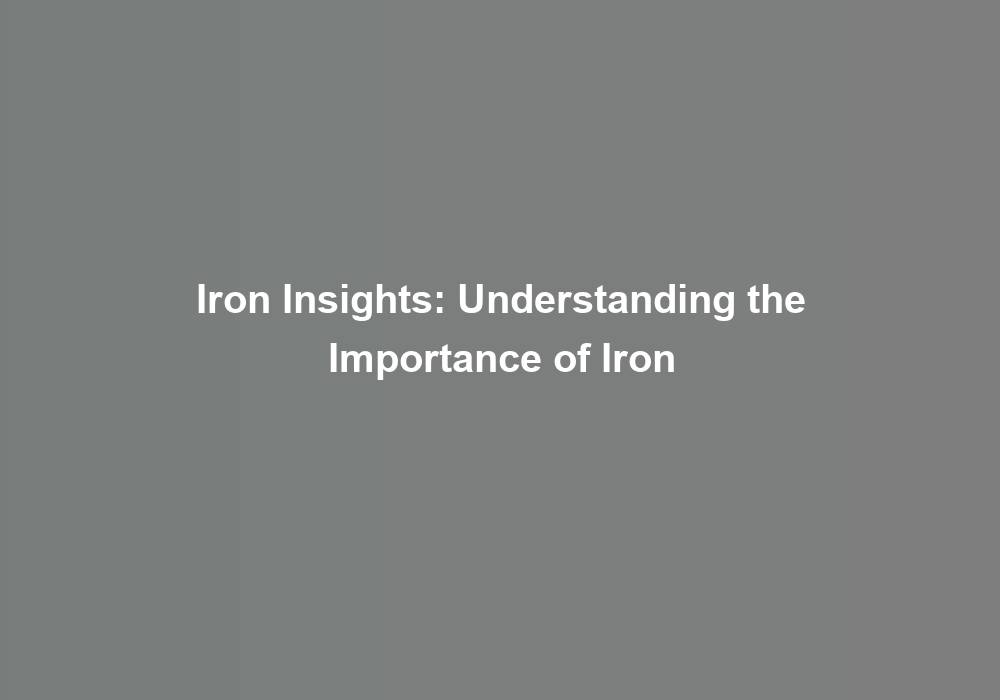Iron Insights: Understanding the Importance of Iron
Iron is an essential element that impacts your overall well-being in ways you might not realize. From energy production to red blood cell formation, iron plays a pivotal role in numerous bodily functions. But what happens when your iron levels dip below the necessary threshold? The implications of iron deficiency are far-reaching and can significantly affect your quality of life. As we explore the intricate web of iron insights, youG??ll uncover the importance of this mineral and gain a deeper understanding of how it influences your health.
IronG??s Role in Energy Production
Iron plays a crucial role in your bodyG??s energy production, helping to transport oxygen and support cellular respiration. Understanding iron metabolism is essential for maintaining optimal energy levels. When you consume iron-rich foods such as lean meats, poultry, fish, lentils, and spinach, you provide your body with the necessary building blocks for energy production. Iron is a key component of hemoglobin, the protein in red blood cells that carries oxygen from your lungs to the rest of your body. Without sufficient iron, your body struggles to produce energy efficiently, leading to fatigue and decreased stamina.
Cellular respiration, the process by which your cells convert glucose and oxygen into energy, relies on iron to function properly. IronG??s role in this process is indispensable, as it helps to facilitate the final steps of energy production within your cells. Without adequate iron, your cells cannot generate energy effectively, leading to feelings of weakness and lethargy. Ensuring that your body has enough iron allows for optimal cellular respiration, ultimately contributing to sustained energy levels throughout the day.
Incorporating iron-rich foods into your diet and being mindful of your bodyG??s iron metabolism can help you maintain the energy levels necessary for an active and fulfilling life. By understanding the significance of iron in energy production and cellular respiration, you can take proactive steps to support your bodyG??s needs and feel a sense of belonging within a community focused on health and vitality.
Impact of Iron Deficiency
Feeling fatigued and lacking stamina may be early signs of iron deficiency in your body. When your iron levels are low, your body struggles to produce enough hemoglobin, the protein in red blood cells that carries oxygen to your tissues. As a result, you may experience cognitive function issues such as poor concentration and decreased memory. This can impact your daily life, making it difficult to focus at work or school, and affecting your ability to perform at your best. Moreover, iron deficiency can weaken your immune system, making you more susceptible to infections and illnesses. Your body needs iron to help maintain a robust immune response, and when youG??re lacking in this essential mineral, your ability to fight off infections may be compromised. This can lead to more frequent illnesses and longer recovery times, ultimately affecting your overall well-being.
ItG??s important to recognize the signs of iron deficiency and take steps to address them. If youG??re experiencing persistent fatigue, weakness, or difficulty concentrating, consider discussing these symptoms with a healthcare professional. By identifying and addressing iron deficiency early on, you can help restore your energy levels, support cognitive function, and bolster your immune system. Incorporating iron-rich foods into your diet or taking supplements as recommended by your healthcare provider can help replenish your iron stores and improve your overall health.
Importance of Iron in Red Blood Cell Formation
You know that iron plays a crucial role in the formation of red blood cells, as it is a key component of hemoglobin, the protein in red blood cells that carries oxygen to your bodyG??s tissues. Without enough iron, your body may not be able to produce sufficient healthy red blood cells, leading to an increased risk of anemia. To ensure adequate iron levels, itG??s important to include iron-rich foods in your diet, such as lean meats, beans, lentils, and dark leafy greens.
Iron and Hemoglobin
In the process of red blood cell formation, iron plays a crucial role in enabling hemoglobin to transport oxygen throughout the body. This vital element also supports enzyme function, ensuring the bodyG??s chemical processes run smoothly. Understanding the significance of iron in hemoglobin formation and its essential role in oxygen transport can help you appreciate the importance of maintaining healthy iron levels in your body.
Iron and Hemoglobin
- Oxygen Transport: Iron is essential for hemoglobin to bind with oxygen and carry it from the lungs to the bodyG??s tissues and organs.
- Enzyme Function: Iron supports the function of various enzymes involved in energy production, DNA synthesis, and immune system function.
- Overall Well-being: Adequate iron levels contribute to overall well-being by ensuring efficient oxygen transport and supporting vital physiological processes.
Anemia Risk
IronG??s crucial role in enabling hemoglobin to transport oxygen throughout the body also underscores its importance in preventing anemia, emphasizing the significance of iron in red blood cell formation. Anemia prevention is closely linked to maintaining adequate iron levels in your body. If youG??re at risk of anemia, incorporating iron-rich foods into your diet or taking iron supplements can help support your blood health. Consuming foods such as lean meats, beans, spinach, and fortified cereals can aid in preventing anemia by ensuring your body has the necessary iron for red blood cell production. However, itG??s important to consult with a healthcare professional before starting iron supplements to ensure youG??re taking the right dosage for your specific needs. Remember, your body relies on iron to keep your blood strong and healthy.
Iron-rich Foods
Incorporating iron-rich foods into your diet can play a crucial role in supporting the formation of healthy red blood cells and preventing anemia. To maximize iron absorption, try these cooking techniques: 1. Use cast-iron cookware to increase the iron content in your meals. 2. Pair iron-rich foods with vitamin C sources, like citrus fruits, to enhance absorption. 3. Avoid cooking acidic foods in cast-iron cookware, as it can decrease iron absorption. While iron supplements can be beneficial, a balanced dietary intake remains essential. ItG??s important to consume a variety of iron-rich foods, such as lean meats, legumes, and leafy greens, to ensure you meet your bodyG??s iron needs. By incorporating these foods and techniques into your meals, you can support your red blood cell formation and overall health.
Dietary Sources of Iron
Hey there! LetG??s talk about the various dietary sources of iron. You can get iron from meat and seafood, as well as from plant-based sources like beans and spinach. Additionally, many foods are fortified with iron, such as breakfast cereals and enriched grain products.
Meat and Seafood
Meat and seafood are excellent dietary sources of iron, providing essential nutrients for maintaining a healthy body. When considering iron intake, itG??s important to choose sustainable seafood options and explore meat alternatives for a balanced diet. Here are some key points to keep in mind:
-
Lean Meats: Incorporating lean cuts of beef, pork, or poultry into your diet can significantly boost your iron intake.
-
Seafood Rich in Iron: Opt for iron-rich seafood such as clams, mussels, and oysters, which are not only delicious but also packed with essential nutrients.
-
Exploring Meat Alternatives: For individuals seeking non-meat sources of iron, tofu, lentils, and chickpeas are great alternatives that can easily be incorporated into various dishes.
Plant-Based Sources
Looking for a plant-based source of iron? YouG??ll be glad to know that there are plenty of vegetarian options to help you meet your iron needs. Incorporating these foods into your diet can contribute to your overall iron absorption. Check out the table below for some plant-based sources of iron that you can easily include in your meals.
| Plant-Based Sources of Iron | Iron Content (per 100g) |
|---|---|
| Spinach | 2.7mg |
| Lentils | 3.3mg |
| Tofu | 2.7mg |
These options not only provide essential nutrients but also offer a sense of belonging to the community of individuals who prefer plant-based diets. Embrace these vegetarian options and nourish your body while feeling connected to others who share similar dietary choices.
Iron-Fortified Foods
Iron-fortified foods are an excellent way to increase your iron intake and maintain optimal levels for overall health. When looking to boost your iron levels, consider incorporating these options into your diet:
-
Iron fortified cereals: These are convenient and tasty breakfast options that can help you meet your daily iron needs.
-
Fortified drinks: Some beverages, such as certain types of fruit juices and plant-based milk alternatives, are fortified with iron, providing a refreshing way to supplement your iron intake.
-
Iron absorption: Remember that consuming iron-rich foods alongside those high in vitamin C can enhance iron absorption, so consider pairing iron-fortified foods with citrus fruits or bell peppers.
While iron-fortified foods can be beneficial, if you struggle to meet your iron needs through diet alone, dietary supplements may be a helpful addition to your routine.
Understanding Iron Absorption
Understanding how your body absorbs iron is crucial for maintaining optimal health and preventing iron deficiency. When it comes to iron absorption, itG??s important to consider the impact of iron supplements and iron absorption inhibitors.
Iron supplements can be beneficial for individuals who are unable to meet their iron needs through diet alone. These supplements provide an additional source of iron, aiding in the prevention and treatment of iron deficiency anemia. However, itG??s essential to be mindful of the type of iron in the supplement, as some forms are absorbed more easily by the body than others. For example, ferrous iron is typically better absorbed than ferric iron.
On the other hand, certain substances can inhibit the absorption of iron in the body. These iron absorption inhibitors include tannins found in tea, calcium, phytates in whole grains, and certain medications. While consuming these substances is not inherently problematic, itG??s important to be aware of their potential impact on iron absorption, particularly for individuals at risk of iron deficiency.
To enhance iron absorption, consider consuming vitamin C-rich foods, which can help increase the absorption of non-heme iron from plant-based sources. Additionally, spacing out iron consumption from iron absorption inhibitors and consuming iron-rich foods separately from calcium-rich foods or beverages can support optimal iron absorption.
Understanding the dynamics of iron absorption and considering the influence of iron supplements and absorption inhibitors can help you make informed choices to support your bodyG??s iron needs.
Managing Iron Levels for Optimal Health
To maintain optimal health, it is important to manage your iron levels effectively through a balanced diet and, if necessary, supplementation. Iron is essential for various bodily functions, such as transporting oxygen and producing energy. Here are some key strategies to help you manage your iron levels for optimal health:
-
Balanced diet: Incorporating iron-rich foods into your meals is crucial for maintaining healthy iron levels. Include foods such as lean red meat, poultry, fish, lentils, beans, tofu, spinach, and iron-fortified cereals in your diet. Pairing these foods with sources of vitamin C, like citrus fruits or bell peppers, can enhance iron absorption.
-
Supplements: If your doctor determines that you have an iron deficiency, they may recommend iron supplements to help restore your iron levels. It is important to follow your healthcare providerG??s guidance regarding the type and dosage of supplements to ensure safe and effective management of your iron levels.
-
Exercise: Engaging in regular physical activity can also contribute to maintaining optimal iron levels. Exercise helps stimulate the production of new red blood cells, which are essential for transporting oxygen throughout the body. Incorporating both aerobic and strength-training exercises into your routine can support overall iron levels and promote overall well-being.
Conclusion
Now that you understand the importance of iron in energy production, red blood cell formation, and overall health, itG??s time to take action. Start incorporating iron-rich foods into your diet and consider talking to a healthcare professional about managing your iron levels. The impact of iron deficiency is significant, but with the right knowledge and proactive steps, you can ensure that your body has the iron it needs to thrive. DonG??t wait, start making changes today.







